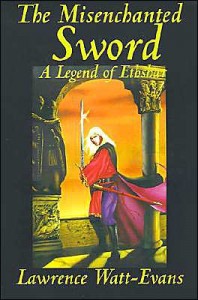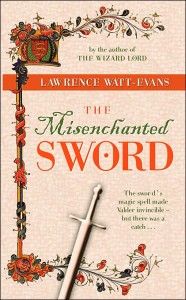
 It’s the height of the Great War when a lone Ethsharitic scout, Valder, finds himself far from home, separated from the rest of his unit, and lost in the depths of a swamp. Accidentally stumbling across an enigmatic hermit, who turns out to be a magician of some quality, Valder ends up saving the old man from maurading enemy forces. As a “reward,” the cranky magician enchants Valder’s sword with spells of battle-prowess and invincibility, before sending him on his way. It’s only after the magician is long-vanished into the swamp that Valder begins to discover that his magical sword may be as much a curse as a gift. In fact, it’s just about as unwelcome a gift as possible, in multiple ways. The sword, now called Wirikidor, or ‘slayer of warriors,’ will indeed grant Valder victory in combat against any one foe … so long as it’s male, human, and adult. Valder’s fate is bound into that of the sword; it’ll grant him protection against all forms of death and keep him alive for as long as it exists, but someday, after it’s taken ninety-nine lives, one battle at a time, it’ll turn upon its owner and kill him. In short, Valder’s life will be extended indefinitely, until he’s killed ninety-nine people, give or take a few, and then the sword will slay -him-.
It’s the height of the Great War when a lone Ethsharitic scout, Valder, finds himself far from home, separated from the rest of his unit, and lost in the depths of a swamp. Accidentally stumbling across an enigmatic hermit, who turns out to be a magician of some quality, Valder ends up saving the old man from maurading enemy forces. As a “reward,” the cranky magician enchants Valder’s sword with spells of battle-prowess and invincibility, before sending him on his way. It’s only after the magician is long-vanished into the swamp that Valder begins to discover that his magical sword may be as much a curse as a gift. In fact, it’s just about as unwelcome a gift as possible, in multiple ways. The sword, now called Wirikidor, or ‘slayer of warriors,’ will indeed grant Valder victory in combat against any one foe … so long as it’s male, human, and adult. Valder’s fate is bound into that of the sword; it’ll grant him protection against all forms of death and keep him alive for as long as it exists, but someday, after it’s taken ninety-nine lives, one battle at a time, it’ll turn upon its owner and kill him. In short, Valder’s life will be extended indefinitely, until he’s killed ninety-nine people, give or take a few, and then the sword will slay -him-.
The army, of course, thinks this is great, and utilizes him as an assassin until the end of the War, at which point Valder opts to return to civilian life. Unfortunately, that still leaves the problem of him owning a magical sword, one which will keep him alive, if not young. He’s faced with a choice: continue to grow old and increasingly infirm while the sword protects him, or try to use up the remaining ‘kills’ stored in the sword’s enchantment, or find a magic-worker capable of undoing the potent spells involved. And all he really wants is to settle down as an innkeeper and live a normal life. His quest to resolve his problems with Wirikidor will span decades and many miles, as he tries to free himself from the misenchanted sword…
I’ve always enjoyed The Misenchanted Sword. As the first in Lawrence Watt-Evans’ entertaining Ethshar series, it sets the tone for the books that followed it. Here we see how one ordinary man deals with magic gone awry, a common theme in the series, and we get a first-hand look at the world-building involved, which lays the groundwork for the Hegemony of Three Ethshars featured in subsequent books. This is the cornerstone of the series, and in many ways it’s one of my favorites, a book I reread every now and again when I want that taste of the old and familiar. Watt-Evans does a great job of playing with ideas, making life difficult through the application of complex, messed-up magic, and examining the results through the eyes of an honest, moral man. Valder’s practical enough to realize what he’s gotten himself into, and yet principled enough to seek resolution in as honest a way as possible, no matter that a man with a magic sword could probably write his own ticket if he was less ethical about the matter.
I can’t quite pin down what I like about the Ethshar books. Maybe it’s the fact that while complex and detailed, they’re not overly complicated. You get a keen sense of the world the characters inhabitat, but it’s not so alien or multilayered that the casual reader will need extra effort to get involved. Watt-Evans keeps things somewhat light, but maintains a certain serious tone and internal consistency, offering up an enjoyable stand-alone fantasy that’s a nice change of pace from the tree-killing, shelf-bending epic trilogies that so often represent the genre. This book has been around since its original printing in 1985, but I was quite happy to see it reprinted by Cosmos Books recently. I hope the rest of the series follows suit, as I think the Ethshar series is an essential read for fantasy lovers.
